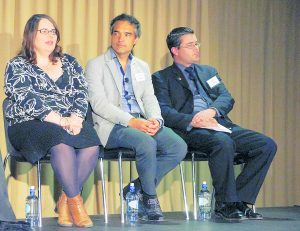by ROWENA OREJANA
Catholic executives in the public sector have found ways to deal with challenges to living their faith in secular environments.

The three Catholic Community Networking speakers who talked of challenges to their faith in the workplace, from left, Deirdre O’Sullivan, Dr Dale Bramley and Dr Joe Harrop, PhD.
Three speakers at the Catholic Community Networking Event on October 21 told guests how they deal with the challenges to their faith. The speakers were Parkinsons NZ chief executive Deirdre O’Sullivan, Waitemata District Health Board CEO Dr Dale Bramley and Sistema Aotearoa programme director Dr Joe Harrop.
Ms O’Sullivan and Dr Bramley said they do not go around announcing they are Catholic, but neither do they hide it.
“I’m quoting my mother a bit tonight. I also remember her saying we should be a window through which other people should see God. And the way to do that is not always to be a Bible basher, it’s always just
to be who you are. Often that surprises people,” Ms O’Sullivan said.
She said she refuses to provide Parkinsons NZ funds to stem cell research. “Sometimes, my organisation does it, and I would have to live with that, but I’ve been fortunate that I have been respected [in my decisions],” she said.
Dr Bramley said he worries about the exclusion of faith in the public health system. “I’m not trying to convert everybody to Catholicism, even though I secretly pray for that,” he said.
Dr Bramley, who was Pope St John Paul II’s altar boy when the late pope celebrated mass in Auckland in 1986, said being a Catholic “is nothing to hide”.
“When I became CEO, I had to give my Christmas message. My comms department did my Christmas message, and it was baubles and reindeer. Being Catholic, I said, ‘No, we’ll go with the Nativity scene’,” he said.
When the message came out, thousands of his staff thanked him.
“The fact is, many thousands of our staff actually have Christian belief and want to see it come through even in our public institutions,” he said.
Dr Bramley said abortion and euthanasia are issues that he has to deal with.
He refuses to sign certificates that allow abortion to be carried out. “I’ve had a discussion with my board, and they understand and someone else signs,” he said.
He had taken a firm stance against euthanasia, but had to be very careful in doing so. “I sent a response out to the whole DHB that it’s not the role … in our DHB to euthanase patients. So, we began to enter some of the debate there,” he said.
Dr Harrop, who got his degree from the Royal Academy of Music, on the other hand, said his faith “normalises” him in the eyes of the children he works with.
Dr Harrop heads Sistema Aotearoa, a programme established through partnership between the Auckland Philharmonic Orchestra and the Ministry for Culture and Heritage. Based in Otara, they provide
music tuition for students from year 2 until they become proficient.
He said he talks about God every day. “It’s just a part of everyday life in Otara. One out of seven schools is a Catholic school. It’s a familiar ground, for one. But also the idea of not believing in God is a foreign concept [to the students],” he said.
He said some of his tutors are agnostic. “I tell them they are coming into a Christian environment and they need to deal with these things,” he said.
“Saying I’m a Catholic and I go to church, that sort of normalises me in the eyes of the kids. As for my tutors, we all buy in to the spirituality of music.”
A very good and encouraging article to read! May God Bless the three of you in standing up for the Faith!